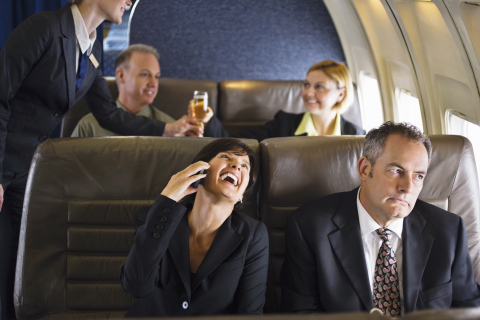You’ve heard it a million times, a happy customer tells a couple of people and an unhappy customer tells everyone. Yet to this day, executives tend to run business strategy with an emphasis on transactions over experiences. More so, business value is expressed in short-term performance metrics and reports to an audience of shareholders and stakeholders over the very people who keep them in business…your customers. It’s all a bit absurd when you think about it.
I know, I know…it’s only business. But, what if business were personal again?
The other day, I read an article that made my jaw drop. In fact, it’s still bruised from hitting the desk with such incredible force. The title of the piece hit home, which is why I clicked through without haste, “Why Airlines Want to Make You Suffer.” The article was written by Tim Wu for The New Yorker and in it, he shares the gut-wrenching but sense-making reality of why flying sucks and why the customer experience with many airlines comes down to three letters: WTF. Turns out there’s money to be made in not just transporting people around the world at 500 mph, that’s yesterday’s business model after all! Instead, squeezing customers for extra dollars in every way is part of a program airline executives employ that can be best described as “strategic suffering.”
See, the more a passenger hates the experience, the more they’re willing to pay incremental fees to avoid repeating it. That’s the theory anyway. These include the following uncommon anomalies some hopeless passengers may endure…
Waiting in line to check in at the counter.
Pushing your way through the cattle call when boarding commencing,
Clamoring for that last overhead bin space that someone else seems to always get.
Doing a last minute repack when you learn your bag weighs just over the maximum allotment.
Having to push their knees against the seat in front of them to mimic a comfortable seating position.
Tussling with your neighbor over space because seats are practically stacked on top of each other these days.
Beg to be treated as a human being by airline representatives.
Losing status because you fly a lot but you don’t pay premium prices for premium seats and services.
Indeed, we’ve all been there.
Hate the Flying Experience? You’re Welcome
Bill McGee, a contributing editor to Consumer Reports who worked in the airline industry for many years, studied seat sizes and summarized his findings this way: “The roomiest economy seats you can book on the nation’s four largest airlines are narrower than the tightest economy seats offered in the 1990s.”
So, why do we suffer this? Why do we tolerate such intentionally shoddy experiences? I believe the answer is as simple as it is profound. It’s because we have to. And if we don’t like it, we can pay for a better experience.
More seats means more revenue.
Wider seats with more legroom equals more revenue.
Guaranteed space in the overhead bin equates to more money.
You get the idea.
It’s not unlike the pain and misery consumers cope with to have the privilege of subscribing to cable or wireless companies. I laugh when I receive emails and txts from these faceless service providers asking if “I’m likely to recommend said company to someone.”
Um, how about no!?
The point is that customer experience should trump everything. Customers have preferences. They choose to support companies that appreciate them. And you know that we live in a sad state of affairs when good customer service makes us feel at ease. You know things are pathetic when today’s customers are willing to pay a premium just to avoid a negative experience.
Wall Street vs. Customer Experience
JetBlue for example has stood up for the everyday flyer over the years. It’s one of the reasons customers love the airline. In fact, they are loyal to the company simply because they’re valued and as such, the customer experience is at the heart of everything. As such, JetBlue refused to follow the pack of hoodlum airlines that colluded in the standardization of extra fees as part of this “strategic suffering” campaign. JetBlue was rewarded for this stance having posted consistent profits and a rising stock over the years while other greedy airlines have underperformed.
But no, the market, meaning Wall Street, won’t have it. They can’t see the benefit of customer experiences and the impact of positive reinforcement on the bottom line. I guess you can’t trade on something so fluffy. Instead, Wall Street analysts and shareholders alike accused JetBlue of being “overly brand-conscious and customer-focused.”
Cue the screeching brakes.
Wall Street has spoken and JetBlue CEO Dave Barger was replaced by Robin Hayes, someone Wall Street hopes is willing to embrace extra fees, narrower seats, and diminished customer experiences…unless they’re willing to pay for something better.
Stifel analyst Joseph DeNardi who pushed for the ouster of Barger celebrated the concerted moans of customers everywhere with a monologue worthy of a Bond villain, “JetBlue is in a nice position where it can do no wrong. Bad news is good news because they will be more likely to pursue a more shareholder friendly business strategy.”
If only shareholders flew like the rest of the people whose experience they’re deliberately compromising.
Now Hayes is wrestling with the balance between appeasing passengers and Wall Street.
To appease investors, Hayes recently announced that JetBlue will add a fee for the first checked suitcase. It’s estimated that this new perk (note the sarcasm) is estimated cash in an additional $200 million annually in the next two years. To ease passenger frustration and improve in flight customer experiences for those in economy, JetBlue will also add 15 seats to its current layout. Profits up. Legroom down. Why does personal space matter anyway?
The most interesting thing here is that JetBlue’s brand was built upon a foundation of customer experience. What happens when the experience dramatically (and intentionally) wanes?
Profits go up sure. But what happens over time? Brand value falls and shareholder value rises for a while. Then what?
It’s Time for Us to Go Our Separate Ways: It’s Not Me, It’s You
What if we cared enough about people to deliver incredible experiences that naturally fed profitable transactions? Said another way, what if we invested in customer experiences so that they were meaningful and more so, what if we rewarded customers not just for their business but also for their digital influence? That’s right, positive conditioning. Investing money, time and resources in the very thing that creates a community of customers willing to pay for a better customer experience at large?
See, investing in strategies that makes doing business with you so incredible eliminates or voids religious metrics such as Net Promoter Score (NPS).
It’s “would you refer someone?” vs. “did you refer someone?”
The answer comes down to the experience someone has and shares. That takes intent and design. Furthermore, the answer to either question should never be an unknown, a surprise nor assumed. The answer is designed as a result of the intentional investment made in meaningful and valued customer experiences. Any brand that places stakeholder or shareholder value above customer experience are simply out of touch with customer preferences, expectations and their power to demand something better. Because, given time and opportunity, they will.
Profit is important. But, a little empathy goes a long way. What starts with experience ends in long-term relationships. And, that’s priceless. People shouldn’t dread doing business with you. Nor should we make human beings pay to suffer a little bit less. In the end, customers and their experiences, are everything.
Connect with me… Twitter | LinkedIn | Facebook | Youtube | Instagram | Pinterest
Photo Credit: LIFESIZE / GETTY IMAGES via TIME






![While AI learns and gets smarter and smarter, I spend my time preparing for the future by… [fill in the blank].
The most important skills of the future are human…
#creativity, #imagination, #individuality, #criticalthinking, #empathy
bit.ly/LifescaleBook 💫
Artist: @asiersanznieto
#promptengineering #prompting #ai #genai #artificialintelligence #keynotespeaker #motivationalspeaker #motivational #motivation #education #learning #leadership #leader](https://briansolis.com/wp-content/plugins/instagram-feed/img/placeholder.png)
Companies, especially airlines, should start to realize that giving even just a little more back to consumers can go a long way. Companies should be wanting to build these relationships that are going to last and encourage consumers to want to pay these extra fees, not because they have to in order to get a good experience, but rather they want to go the extra mile for their company and get the extra mile back in return.
Bailey Wells
Freeman School
indeed!
Amen Brian.
Every time the regulators start sniffing around, the airlines claim self-regulation. I’m no fan of more government rules, but it seems to me minimum (humane) standards in a federal passenger bill of rights is necessary.
There are other examples beyond (a realistic) expectation of personal space, storage and courtesy. It demonstrates how deeply rooted the problem is — your theory plus a few others.
Fuel surcharges are a good example. Clearly airlines negotiate longer contracts for fuel to reduce the downside risk, but at some point, the lower cost of fuel should be reflected in the price of a ticket. That isn’t happening. How long will it take?
It’s in the language too. Terms such as “direct flight” are misleading. Direct flight does not mean nonstop. Who’d have guessed? Maybe they should (be forced to) include a little disclaimer like those we see and hear on pharma ads.
The (poor) treatment of employees is notorious and yet another dimension, especially among the traditional carriers. Pushing out the veterans, who grew up with a customer service mentality. They do this because older employees are paid more. Airlines have vigorously replaced them with younger folks, on meager salaries, who ill afford anything but shared living in most metro areas.
If you treat employees like dirt, they will treat your customers like dirt, and that adds insult to knee injury from the reclining seat in front.
It can be seen in more subtle ways too. For example, it used to be that pilots too took great pride in setting an aircraft down gently. I used to love watching the landing on a big screen of a cabin on a DC-10. I’m not sure if it’s automation or not, but it’s been a looooong time since I’ve felt a smooth landing. Those planes get smacked down on the runway like a jaw
hitting the table after reading a shocking report in The New Yorker.
Then there are *those* stories. Hours on a tarmac. No air, no restrooms, no food. Finally
the fines set in and that changed the behavior a bit, though such incidents still make headlines now and again. What are they thinking?!
I’m not convinced NPS scores can fix this problem. That seems to me akin to a new paint job on a newly merged airline, when really, the entire fleet needs to be replaced.
Above all, what amazes me the most is that there isn’t room for a competitor to displace someone. Even the scrappy low cost airliens that nailed this niche are moving away from this model. A row of seats added here, a new fee tacked on there… It boggles my mind some young upstart airline can’t find a way to make the economics — and the NPS score — work.
Perhaps it’s the difference between profitability and greedy profitability. A good place to
look for it is executive incentives listed on a 10k – and usually from the same airlines in dispute with the unions.
In the end, fewer consumers would notice or complain so loudly if the entire experience
wasn’t sheer misery.
I was but a kid when Reagan broke the mechanic strike, and this sort of talk is the antithesis of the politics I’ve held for most of my life. Then again, everyone has thresholds.
LOVE!
Spot on as far as the airline experience goes — especially last two. I’ve personally experienced this as even a “GOLD” member of Lufthansa (Miles & More). The latest incident exposes the farce of their so-called “LOYALTY”. When I signed up, they told me miles will NEVER expire. I guess their NEVER has a time-stamp only they can see. First they go and “expire” 4 upgrade vouchers to First Class. Now they tell me 1,12,000 miles from my account will expire end of this year. *APPLAUSE*. I love the farcical program.
Thanks for this great article Brian. It seems like big companies but even smaller companies still don’t get it. In my eyes the Post Commerce is the most important stage in the strategy, because Post Commerce creates awareness. To bad that still many companies don’t get this and are going for the small run instead for the infinite run.
Thank you Wouter!
I agree that the increase in “calculated misery” by JetBlue will negatively affect their relationship with customers. I also think its important to consider how to structure the importance of brand management to Wall Street investors interested in maximum profits. Investors are interested in the maximum profits possible to drive up company value and
stock prices. They are very good at analyzing bottom lines, 10Ks, and balance
sheets, but fall short in their analysis of branding. Investors undervalue the
JetBlue brand because of a misunderstanding of JetBlue’s customers. Investors
see business flyers as a focus for airlines because they book tickets late, pay
full cost, and fly more often than vacationers. Business flyers value speed,
reliability, and convenience. They do not fear extra fees like luggage fees or
paying more for business class. For investors it makes sense to stretch each
JetBlue flight to capture maximum profit from these business travelers.
However, investors underestimate the importance of the JetBlue brand to
vacation and family travellers.
JetBlue has developed a larger online following than its competitors because of its ability to build relationships with family travellers. Millennial moms connect with JetBlue at a
disproportionately high rate in comparison to its competitors. JetBlue has
capitalized on this segment by hiring 25 (mostly stay-at-home moms) to man
their social media and engage with consumers. They have gained over 1.9 million
followers on Twitter and 1 million followers on Facebook by leveraging their
social media team and loyal customers. JetBlue has cultivated a larger online
following than their competitor Delta despite being a fraction of the size.
Moms and other leisure travelers appreciated JetBlue’s low cost and especially
their lack of fees. Family travelers have developed a connection with JetBlue
and consider it “their” airline. JetBlue has ranked the highest in customer
satisfaction because of this relationship. Business travelers are less likely to
develop a connection with an airline because fees and ticket expenses are less
personally relevant. JetBlue’s increase in fees may not affect business
travelers, but it will affect family travelers.
Consumers are drawn to brands they trust. JetBlue has developed a relationship with consumers by maintaining a consistent brand with no fees and no fuss. Coca-Cola has become of the world’s most valuable brands by delivering a consistent experience for a century. In 1975, Coca-Cola introduced “New Coke” because their traditional formula was falling behind Pespi. The product failed miserably and customers were outraged. Over
400,000 people called into the company upset about the change. One woman who
had not had coke in 30 years called into headquarters in tears that they had
changed “her” coke. While most consumers may not be in tears about the change
in JetBlue’s policy, JetBlue stands to lose a lot of support from loyal
customers with their increases in “calculated suffering”. Coca-Cola
reintroduced classic coke three months after the launch of “New Coke” and
consumers were delighted. Coke’s sales proceeded to increase at more than twice
the rate of Pespi’s. Coca-Cola reaffirmed their original values and dedication
to the integrity of their product by reintroducing the classic formula. JetBlue
has an opportunity to do the same with the reintroduction of no fees flights.
Currently, JetBlue risks losing the consumer mindset of “our airline” and
becoming just another airline. The question is, will JetBlue be able to restore
the integrity of their brand among the key segment of leisure travelers or will
they continue to go succumb to the pressures of Wall Street?
Can’t say how much I love this comment. Thoughtful. Thorough. Informative.